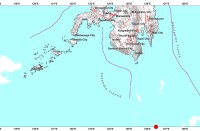QUEZON City, Philippines – The North Korean government announced on August 10 its plan to fire four Hwasong-12 missiles at Guam, a major United States military hub.
The Hwasong-12 is an intermediate-range ballistic missile with a radius of 3,700 kilometers.
It can be fired from mobile launchers at a very high angle.
North Korea’s threat also scared many neighboring countries, including those in Asia.
If that happens, are we prepared?
What are the steps we need to take to survive if missiles and nuclear attacks take place?
What do we need to know about nuclear attack?
A ballistic missile is a missile that follows a ballistic trajectory with the objective of delivering one or more warheads to a predetermined target.
Nuclear weapons, on the other hand, are extremely powerful and could cause destruction throughout the world.
A nuclear explosion can kill millions; the explosion alone can wipe out countless numbers of people.
Even after the blast, nuclear weapons can do damage through nuclear fallout, when the wind carries radioactive materials through the air, killing people, animals, and plants in an instant.
“Anyone within a half-mile of the explosion would have only a 10 percent chance of survival — bodies very close to the explosion would be vaporized. Nuclear detonation can generate temperatures in tens of millions of degrees,” Irwin Redlener, director of the National Center for Disaster Preparedness at Columbia University’s Earth Institute said.
He said those outside but “within a 2-mile radius would have a 50 percent chance of being killed instantly.
“People up to 8 miles away would stand a 10 to 20 percent chance of being killed instantly,” Redlener added.
“If you are outside, and you survive the initial blast, you have 10 to 20 minutes to get to a shelter as far away from the blast as possible. That’s roughly the amount of time it takes for the radioactive material from the mushroom cloud to begin falling back to the ground and spreading. It should be a place you can stay in for a 24- to 48-hour period until authorities can give instructions,” he explained.

Can’t See the Infographics?
Click here: What to do in case of a nuclear attack?






